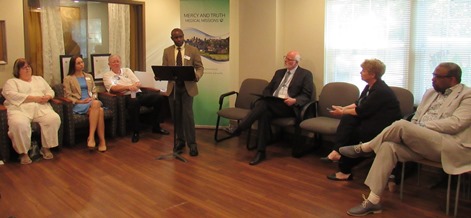
by Mary Rupert
What’s needed to improve health in Wyandotte County?
That was the topic on Thursday morning in an informal “Muffins with the Mayor” discussion at the Mercy and Truth Medical Mission, 721 N. 31st St., Kansas City, Kansas.
Mercy and Truth is one of several safety net clinics in Wyandotte County. Some of their clients are uninsured.
Participants in the discussion touched on a number of issues, including the need to expand KanCare (Medicaid in Kansas) and cover more uninsured patients, the need to bridge a language barrier that slows down communication with patients, good jobs that would provide health insurance for employees, and a better environment including more walks or pathways for exercise.
One discussion participant, Catherine Sarensen, membership marketing team leader at Sam’s Club in Kansas City, Kansas, which provided the refreshments and also made an $1,800 donation to Mercy and Truth clinic, shared a personal story about a family member’s experience with the health care system.
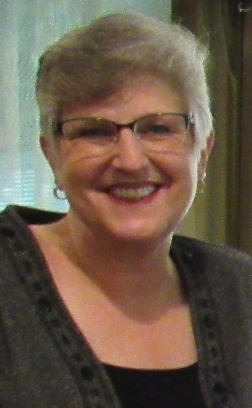
She said the family member had an immune disease, could not work, and could not get marketplace insurance.
“We didn’t have care for her,” she said. “She’s still sick.”
It’s important to get the word out about safety net clinics, she said, as several years ago they had no idea that the clinic was here.
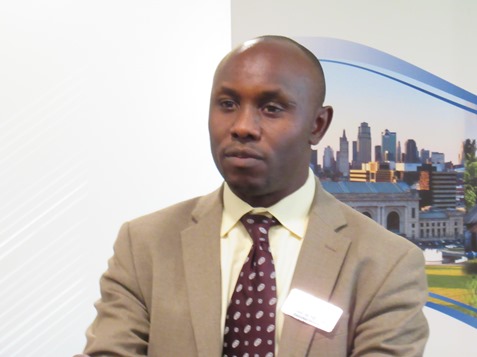
Dr. Geofrey Kigneyi, the executive director of Mercy and Truth Clinic, told the group that when it started in 2007, Mercy and Truth in Kansas City, Kansas, was seeing 5,000 patients, by 2018 it was up to 7,000 patients, for 2019 it anticipated 9,000 patients, but already it looks like it will exceed 10,000 patients in 2019.
“Jobs are the No. 1 problem for Wyandotte County,” said Unified Government Commissioner Jane Philbrook. Jobs are necessary that have insurance with them.
She said people have to reach out to get health care for themselves and their families.
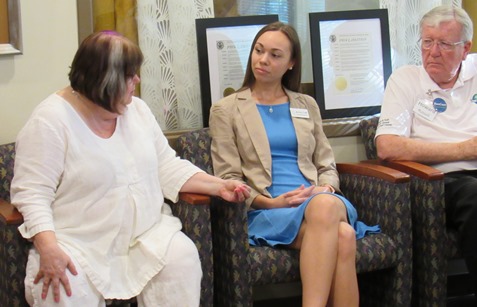
Howard Russell, an ex-officio board member of Mercy and Truth Clinic, said that often, the amounts patients pay at the safety net clinics do not cover the costs of such items as blood tests and radiology.
Another participant in the discussion, from a safety net clinic, said that one of the local hospitals is not accepting referrals of patients without a Social Security number. Some of them have cancer or serious diseases.
“I think that is unacceptable,” she said. “I just think that’s preposterous.”
“We are all people and everybody deserves health care,” she said. The Mercy and Truth Clinic does not require patients to have a Social Security number.
The University of Kansas Hospital in Kansas City, Kansas, does not require patients to have Social Security numbers, according to a hospital official.
It also is a challenge for safety net clinics to address serious illnesses and complicated cases, said a participant from another safety clinic. They sometimes receive some funding from foundations to help.
“We send a lot of referrals,” Dr. Kigneyi said, “but the waiting list is long.”
Mark Schmidt, a board member at Mercy and Truth, said the specialty care is really a needed resource. Prescriptions and radiology are something that others take for granted, but they are hard to come by for the patients at the safety net clinics, and help would be appreciated.
Barry Johnson, another participant, said adding walking paths in the community and teaching people healthier habits would help improve health here.
Another participant urged the mayor and UG Commission to use their purchasing power to set an example to pay for health, not fee per service.
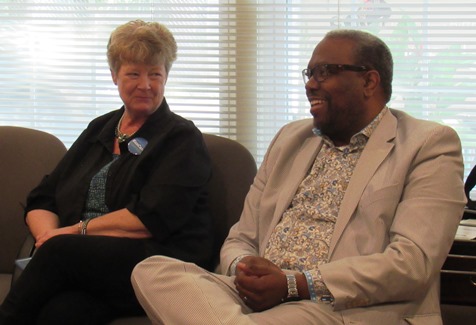
UG Commissioner Harold Johnson said that jobs, affordable housing and the language barrier all are important issues, and that trying to reduce poverty in the community is important.
“We have to figure out a way to pragmatically prepare our people for jobs,” Commissioner Johnson said. A lot of times, the technology is not there and there’s a language barrier, he added.
“If you raise the income, reduce poverty, it raises all of our communities up in terms of their access to health care,” he said. “It will be that rising tide that raises all boats.”
UG Commissioner Melissa Bynum said expansion of Medicaid, or KanCare, is her top priority for health care. She added that Rep. Kathy Wolfe Moore, D-36th Dist., had led the effort in the House for KanCare expansion.
Also, affordable housing is one of the key components that could improve community health, she believes. Keeping people living in their homes and keeping it affordable is key to improving health, she said.
KanCare passed in the House, but failed in the Senate during the past session.
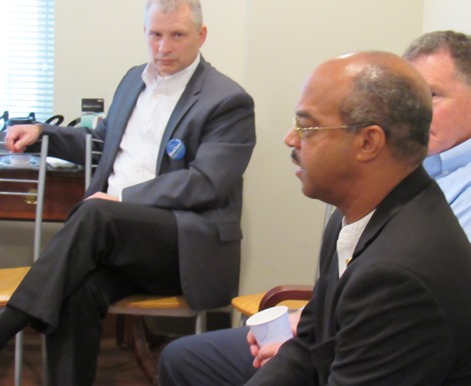
Sen. David Haley, D-4th Dist., commented on the inequities between the wealthier areas and those that were not as wealthy. He said while waiting for the bill to pass, other things might be done to help stabilize the inequities. He has supported Medicaid expansion.
He said he was concerned about neonatal care and low birth weight especially in communities of color. He said he doesn’t know the answer to this situation but he appreciated those who continue to work on it.
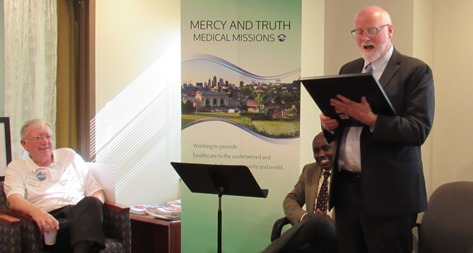
Mayor David Alvey said a travesty in this country is the “geographical and psychological distance that we put between ourselves and the poor.”
Mayor Alvey said that people who had direct contact in working with the poor, such as tutoring children, mentoring women, and working in the food kitchen, would be moved to serve and would have a commitment together to address the problem.
He said what the safety net clinics are doing, reaching out and serving the poor, is best.
“That, I think, would then solve the problem of KanCare, because there would be a broader and deeper commitment to make those necessary changes to serve all people,” he said.
Once people meet the poor, it moves and changes them, and then they are moved to act, he added.
“Getting to know the poor is the beginning of all we do,” he said. He also thanked Mercy and Truth and the safety net clinics for what they do.
During this event, it was announced that Mercy and Truth Clinic would be receiving 200 flu shots from the Kansas Department of Health and Environment that will be available this year.
During the event, Mayor Alvey also read a proclamation declaring Aug. 12 to 16 as Safety Net Clinic Week.
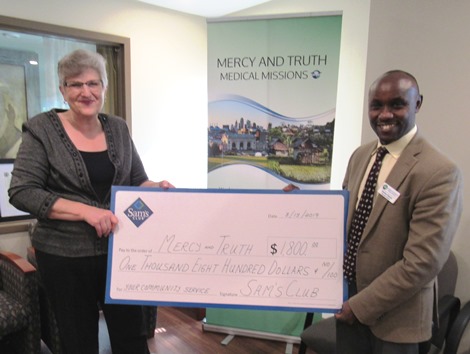

More non-smoking areas will help immensely.